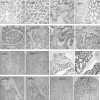Reduced protein expression of metastasis-related genes (nm23, KISS1, KAI1 and p53) in lymph node and liver metastases of gastric cancer
- PMID: 17504447
- PMCID: PMC2517304
- DOI: 10.1111/j.1365-2613.2006.00510.x
Reduced protein expression of metastasis-related genes (nm23, KISS1, KAI1 and p53) in lymph node and liver metastases of gastric cancer
Abstract
Purpose: Metastasis remains an incurable common complication in patients with gastric cancer. A variety of theories have been proposed to explain the inefficiency of the metastatic process. To compare protein expression of metastasis-related genes (nm23, KISS1, KAI1 and p53) between primary tumours and metastatic tumours may be useful in illustrating these theories.
Methods: Metastasis-related tissue microarrays (including normal tissues, primary tumours, nodal metastases and liver metastases) were constructed. The protein expression of nm23, KISS1, KAI1 and p53 in lymph node and liver metastases from advanced gastric cancer specimens was mainly examined by immunohistochemical staining in relation to primary tumours.
Results: Immunohistochemical staining showed reduced protein expression of nm23, KISS1 and KAI1 in lymph node and liver metastases compared with primary tumours. Results for p53 were to the contrary.
Conclusions: Our investigations revealed a tendency of reduced protein expression of metastasis suppressor genes nm23, KISS1 and KAI1 in gastric cancer with the progress of metastasis. This means that the progression theory is an important determinant of metastatic efficiency.
Figures



Similar articles
-
[Gastric cancer with P53 overexpression and nm23 low-expression has high potential for lymph node metastasis].Zhonghua Zhong Liu Za Zhi. 1995 Nov;17(6):418-21. Zhonghua Zhong Liu Za Zhi. 1995. PMID: 8697991 Chinese.
-
Reduced metastasis-suppressor gene mRNA-expression in breast cancer brain metastases.J Cancer Res Clin Oncol. 2005 Mar;131(3):191-8. doi: 10.1007/s00432-004-0629-9. Epub 2004 Dec 8. J Cancer Res Clin Oncol. 2005. PMID: 15592684 Free PMC article.
-
nm23 protein expression in colorectal carcinoma metastasis in regional lymph nodes and the liver.Eur J Surg Oncol. 2001 Mar;27(2):170-4. doi: 10.1053/ejso.2000.1070. Eur J Surg Oncol. 2001. PMID: 11289754
-
[Cancer metastasis and metastasis suppressors].Korean J Gastroenterol. 2004 Jan;43(1):1-7. Korean J Gastroenterol. 2004. PMID: 14745245 Review. Korean.
-
CD82 metastasis suppressor gene: a potential target for new therapeutics?Trends Mol Med. 2005 Dec;11(12):563-70. doi: 10.1016/j.molmed.2005.10.002. Epub 2005 Nov 3. Trends Mol Med. 2005. PMID: 16271511 Review.
Cited by
-
Metastasis suppressor NME1 regulates melanoma cell morphology, self-adhesion and motility via induction of fibronectin expression.Exp Dermatol. 2015 Jun;24(6):455-61. doi: 10.1111/exd.12697. Epub 2015 Apr 27. Exp Dermatol. 2015. PMID: 25808322 Free PMC article.
-
Analysis of chromosomal aberration (1, 3, and 8) and association of microRNAs in uveal melanoma.Mol Vis. 2009 Oct 22;15:2146-54. Mol Vis. 2009. PMID: 19898689 Free PMC article.
-
Tetraspanins: Novel Molecular Regulators of Gastric Cancer.Front Oncol. 2021 Jun 18;11:702510. doi: 10.3389/fonc.2021.702510. eCollection 2021. Front Oncol. 2021. PMID: 34222025 Free PMC article. Review.
-
Clinical Implication and the Hereditary Factors of NM23 in Hepatocellular Carcinoma Based on Bioinformatics Analysis and Genome-Wide Association Study.J Oncol. 2018 Dec 18;2018:6594169. doi: 10.1155/2018/6594169. eCollection 2018. J Oncol. 2018. PMID: 30662464 Free PMC article.
-
Clinical-translational approaches to the Nm23-H1 metastasis suppressor.Clin Cancer Res. 2008 Aug 15;14(16):5006-12. doi: 10.1158/1078-0432.CCR-08-0238. Clin Cancer Res. 2008. PMID: 18698018 Free PMC article. Review.
References
-
- Adachi M, Taki T, Leki Y, Huang CL, Higashiyama M, Miyake M. Correlation of Kai1/CD82 gene expression with good prognosis in patients with non-small cell lung cancer. Cancer Res. 1996;56:1751–1755. - PubMed
-
- Arnaud-Dabernat S, Bourbon PM, Dierich A, Le Meur M, Daniel JY. Knockout mice as model system for studying nm23/NDP kinase gene functions. Application to the nm23-M1 gene. J. Bioenerg. Biomembr. 2003;35:19–30. - PubMed
-
- Debies MT, Welch DR. Genetic basis of human breast cancer metastasis. J. Mamm. Gliand. Biol. Neopl. 2002;6:441–451. - PubMed
-
- Dhar DK, Naora H, Kubota H, et al. Downregulation of KiSS-1 expression is responsible for tumor invasion and worse prognosis in gastric carcinoma. Int. J. Cancer. 2004;111:868–872. - PubMed
MeSH terms
Substances
LinkOut - more resources
Full Text Sources
Other Literature Sources
Medical
Research Materials
Miscellaneous

